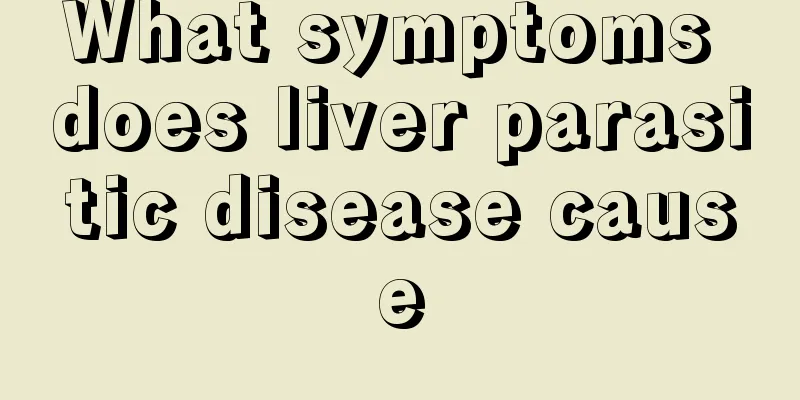What symptoms does liver parasitic disease cause

|
Parasites have always been with us, but sometimes they are not so active. However, due to some living habits of people, parasites can become rampant. If you like to keep pets in your life but don’t pay attention to their hygiene, it will cause some parasitic diseases. In terms of diet, it is related to liking to eat raw food or not cooking the food. Liver parasites can only be discovered through examination, so when some symptoms appear in the body, you must pay attention. 1. Hepatitis-like reaction Acute cases may cause fever, abdominal pain, urticaria, and liver enlargement. These are the symptoms caused by Fasciola hepatica, which are generally divided into 4 stages. The acute phase may cause fever, abdominal pain, flatulence, vomiting, diarrhea, or constipation. Gastrointestinal discomfort occurs during the latent period, but it is not obvious. The chronic stage causes fatigue, right upper quadrant pain, nausea, anorexia, anemia, and jaundice. Ectopic damage means that the parasites appear outside the liver and can even flow through the blood to the lungs, stomach, eye sockets and other parts. If you have the habit of eating raw beef or mutton, this parasite will also appear in the throat. 2. Cholecystitis Sinensis fluke can cause reactions similar to cholecystitis and cholangitis. Severe infections can manifest as allergies, gastrointestinal discomfort, abdominal distension, loss of appetite, weakness in the limbs, and aversion to greasy food. S. sinensis likes to parasitize in humans and carnivorous mammals. The first host is snails, the second host is fish and shrimp, and finally it parasitizes humans, cats, dogs, etc. Therefore, eating sashimi, fish sashimi, fish sushi, or incompletely heating seafood may cause parasites to enter the body. 3. Pain in the liver area accompanied by shortness of breath Echinococcus granulosus may appear in many places in the human body, but most often in the liver. Mild pain will occur in the infected area, and shortness of breath and chest pain will occur in the lungs. It is easily accompanied by urticaria, poisoning, gastrointestinal dysfunction, weight loss, etc. The final host of Echinococcus granulosus is carnivores such as dogs. If humans accidentally eat the eggs, they are also prone to infection. Therefore, the chances of pets at home getting parasitic infections are higher than for ordinary people. And it is easy to develop into echinococcosis. |
<<: What are the symptoms of unilateral chin loss
>>: What are the differences between cold and dampness and damp heat symptoms
Recommend
What are the dietary treatments for gastric cancer patients
During the period of gastric cancer, patients are...
How long can black fungus be kept
Fungus is a very common ingredient. It is delicio...
Analyzing the clinical manifestations of kidney cancer for you
Kidney diseases are very harmful to the human bod...
Is it easy to lower high transaminase?
Transaminase is an important substance in the hum...
What is the reason for cold and numb feet
Foot numbness is a very common phenomenon in dail...
How should a stye inside the eye be treated?
People's eyes rarely get sick, but once a dis...
Why does it itch when mosquitoes suck blood
In the hot summer, due to the influence of the cl...
What folk remedies can relieve cough
We all know that honey has the effect of changing...
The harm of eating turkey noodles_The disadvantages of eating turkey noodles
The biggest feature of turkey noodles seems to be...
How to get rid of mites in quilts
It can be said that mites are everywhere in life,...
Boys with slanted chin
If a boy is called good-looking, he must have reg...
Swollen gums cause swollen jaw
Many people often suffer from getting inflamed, w...
Endometrial cancer edema treatment device
Clinically, many people do not pay attention to t...
Traditional Chinese medicine prescription for treating colon cancer
It is understood that there are many causes of co...
How to overcome frequent frowning
Wrinkles will appear as you age and your skin bec...









